(Yahoo) Nick Saban sat down with ESPN’s Chris Low recently and discussed a number of subjects, including the factors that played into his decision to retire from coaching in general and Alabama specifically.
Saban’s comments have gotten plenty of attention, as they should. When the GOAT speaks, everyone should listen. His perspective is informed and important. There’s a lot of depth and context to what was said, though, that goes beyond the basic headlines or bullet points — “NIL chased Saban out” or “players aren’t the same.”
So let’s dig into some thoughts on that, but first, here are the pertinent quotes.
The one making the most headlines involves his team’s reaction to an overtime loss in the national semifinals to Michigan.
“I want to be clear that wasn’t the reason, but some of those events certainly contributed,” Saban said of his decision to retire. “I was really disappointed in the way that the players acted after the game. You gotta win with class. You gotta lose with class. We had our opportunities to win the game and we didn’t do it, and then showing your ass and being frustrated and throwing helmets and doing that stuff … that’s not who we are and what we’ve promoted in our program.”
Then he discussed meetings with the players after the season.
“I thought we could have a hell of a team next year, and then maybe 70 or 80 percent of the players you talk to, all they want to know is two things: What assurances do I have that I’m going to play because they’re thinking about transferring, and how much are you going to pay me?” Saban recounted. “Our program here was always built on how much value can we create for your future and your personal development, academic success in graduating and developing an NFL career on the field.
“So I’m saying to myself, ‘Maybe this doesn’t work anymore, that the goals and aspirations are just different and that it’s all about how much money can I make as a college player?’ I’m not saying that’s bad. I’m not saying it’s wrong, I’m just saying that’s never been what we were all about, and it’s not why we had success through the years.”
OK, let’s break this down.
1. Coaching college football has changed
College football’s powerbrokers will have you believe the sport is currently in a period of doom and gloom — the narrative that NIL and the transfer portal have destroyed the game or killed the game or done whatever to the game. Some of Saban’s comments fit perfectly with that.
There is no debating that the game has changed and, as such, so has the job of coaching the game. However, Saban went to lengths throughout the story that this was just one aspect. He was also 72 and said the energy level needed to be the best is hard to maintain. Additionally, he couldn’t promise recruits he’d stay for four years and was losing assistants at a rapid rate.
It’s not like one second-stringer asking about playing time — is that even a bad thing? — just drove him out.
2. But what industry doesn’t change?
Saban was the best at stacking No. 1-rated recruiting classes on top of each other, often three, four and even five years in a row. He was a magnet for not just five-star talents, but five-star workers and competitors. Life at Alabama would be full of challenge and competition, but Saban’s system offered the most proven route to the NFL, with national championships along the way.
It was understandably enticing. Perhaps it is less so now. Easy access to short-term money and playing time via the no-penalty portal chipped away at Saban’s proven formula — get great players and coach them up. You can understand why rather than adapt he chose to call it quits.
Likewise, like any good teacher, he seemed to find great motivation and enjoyment from developing his students/players. Saban always beamed with joy when discussing his one-time recruits as draft prospects or NFL stars. Losing some of that as the sport became more transitional and transactional, causing his time with kids to be limited, seems to have adversely and understandably impacted his interest in continuing.
That’s too bad. That is college football’s loss. The sport is better with Nick Saban around.
However, what industry doesn’t change? If anything, the duties of a college football coach are more similar to what they were two decades ago than the vast majority of professions.
Besides, unless the United States Supreme Court is replaced with new justices who see the NCAA’s relationship with the Sherman Antitrust Act differently than the current justices, there isn’t much that can be done.
3. The fearmongers were wrong
Saban stating that “maybe 70 or 80 percent” of even his team was at least inquiring about transferring in search of playing time and/or NIL money is one more bit of proof that the original fearmongering around those things was 100 percent wrong.






